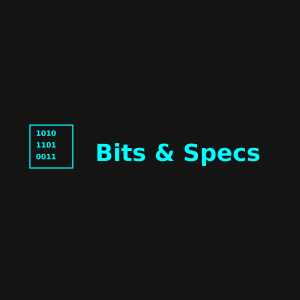Bits And Specs
Welcome to Bits and Specs — the podcast that decodes the internet’s building blocks, one protocol at a time. Each week, we take you beyond the jargon and into the real-world stories behind RFCs, standards, and the specs that quietly run our digital lives. Whether you’re a seasoned engineer or just curious how the web actually works, we break down the bits, the bytes, and the brilliance behind the specs shaping our connected world.
Episodes

4 hours ago
4 hours ago
In this episode of Bits and Specs, we unpack BGP (Border Gateway Protocol) — the control plane of the internet. Using insights from RFC 4271, we explore how BGP connects thousands of autonomous systems (ASes) to make global routing possible. You'll learn how BGP works, what makes it different from internal routing protocols like OSPF, and how concepts like AS_PATH, route advertisements, and policy control form the backbone of the internet.
We also dive into real-world incidents like BGP hijacks and global outages, and why BGP — despite being designed in the 1980s — still powers the modern web. If you've ever wondered what keeps your packets on the right path, this episode is for you.
🧠 Researched using RFC 4271 with support from Google NotebookLM.

2 days ago
2 days ago
In this episode of Bits and Specs, we explore gRPC — Google’s high-performance, open-source RPC framework that’s powering everything from microservices to AI pipelines. We break down how gRPC works using Protocol Buffers, IDLs, and HTTP/2, and explain why it’s faster, leaner, and smarter than traditional REST APIs. With real-world examples from cloud systems, streaming platforms, and agent backends, this episode unpacks why gRPC is becoming the protocol of choice for developers building distributed, language-agnostic systems. Whether you're designing LLM infrastructure or just tired of JSON, this is the protocol you should know.
🧠 Researched using official documentation from grpc.io and structured with the help of Google NotebookLM.

2 days ago
2 days ago
In this episode of Bits and Specs, we explore the Model Context Protocol (MCP) — an emerging open standard for how AI agents discover tools, patch memory, and evolve mid-conversation. Unlike traditional plugin systems or rigid APIs, MCP defines a modular, dynamic architecture for building composable, intelligent agents that can reason, route, and adapt in real time.
We break down MCP’s core components — including resolvers, manifests, context patching, and tool invocation — and explain how this protocol lays the foundation for agent ecosystems that go far beyond prompt engineering. Whether you're an LLM developer, infrastructure nerd, or just AI-curious, this episode reveals why MCP may be the protocol behind the next generation of AI assistants.
🧠 Researched using official definitions and documentation from modelcontextprotocol.io with the help of Google NotebookLM.

2 days ago
2 days ago
In this episode of Bits and Specs, we go back to the protocol that built the modern internet: TCP — Transmission Control Protocol. It’s the reason your messages arrive in order, your video streams don’t collapse, and your apps (mostly) behave. From three-way handshakes and flow control to congestion avoidance and port numbers, we unpack what makes TCP the backbone of reliable communication. Plus, we explore how newer protocols like QUIC challenge its dominance — and why TCP still won’t die quietly.
🧠 Researched with help from Google NotebookLM and RFC 793, the original TCP spec.

3 days ago
3 days ago
In this episode of Bits and Specs, we break down RFC 1035, the foundational document that defines the Domain Name System (DNS) — the protocol that turns human-friendly names like google.com into machine-routable IP addresses. We explore how DNS queries and responses work, what recursion and caching really mean, and how this 1987 spec still powers the modern internet, APIs, AI agents, and everything in between. From root servers to TTLs, you’ll never look at a URL the same way again.
🧠 This episode was researched and drafted using Google NotebookLM with RFC 1035 as the primary source.

4 days ago
4 days ago
n this episode of Bits and Specs, we dive into RFC 9000 — the spec behind QUIC, the modern transport protocol powering HTTP/3. Say goodbye to slow handshakes and head-of-line blocking, and hello to lightning-fast, secure connections over UDP. We break down how QUIC works, why it matters for real-time apps, mobile performance, and even LLM-powered agents. If you’ve ever streamed a video, loaded a site, or called an API, QUIC is quietly making it better.
🎧 This episode was researched and drafted using Google NotebookLM with RFC 9000 as the primary source.

4 days ago
4 days ago
In this episode of Bits and Specs, we pull back the curtain on RFC 9311 — the spec behind Oblivious HTTP (OHTTP). Discover how this privacy-preserving protocol hides your identity from servers, secures your LLM queries, and challenges traditional ideas of client-server communication. From gateways and encrypted payloads to the future of AI agent privacy, we make OHTTP simple, practical, and surprisingly exciting.
🧠 This episode was researched and drafted using Google NotebookLM, with RFC 9311 as the source document.







